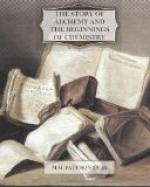Lavoisier supposed that the stages in the complete reaction between mercury and nitric acid were these: the withdrawal of oxygen from the acid by the mercury, and the union of the compound of mercury and oxygen thus formed with the constituents of the acid which remained when part of its oxygen was taken away. The removal of oxygen from nitric acid by the mercury produced nitrous air; when the product of the union of the oxide of mercury and the nitric acid deprived of part of its oxygen was heated, more nitrous air was given off, and oxide of mercury remained, and was decomposed, at a higher temperature, into mercury and oxygen.
Lavoisier thought of these reactions as the tearing asunder, by mercury, of nitric acid into definite quantities of its three components, themselves distinct substances, nitrous air, water, and oxygen; and the combination of the mercury with a certain measurable quantity of one of these components, namely, oxygen, followed by the union of this compound of mercury and oxygen with what remained of the components of nitric acid.
Lavoisier had formed a clear, consistent, and suggestive mental picture of chemical changes. He thought of a chemical reaction as always the same under the same conditions, as an action between a fixed and measurable quantity of one substance, having definite and definable properties, with fixed and measurable quantities of other substances, the properties of each of which were definite and definable.
Lavoisier also recognised that certain definite substances could be divided into things simpler than themselves, but that other substances refused to undergo simplification by division into two or more unlike portions. He spoke of the object of chemistry as follows:—[8] “In submitting to experiments the different substances found in nature, chemistry seeks to decompose these substances, and to get them into such conditions that their various components may be examined separately. Chemistry advances to its end by dividing, sub-dividing, and again sub-dividing, and we do not know what will be the limits of such operations. We cannot be certain that what we regard as simple to-day is indeed simple; all we can say is, that such a substance is the actual term whereat chemical analysis has arrived, and that with our present knowledge we cannot sub-divide it.”
[8] I have given a free rendering of Lavoisier’s words.
In these words Lavoisier defines the chemical conception of elements; since his time an element is “the actual term whereat chemical analysis has arrived,” it is that which “with our present knowledge we cannot sub-divide”; and, as a working hypothesis, the notion of element has no wider meaning than this. I have already quoted Boyle’s statement that by elements he meant “certain primitive and simple bodies ... not made of any other bodies, or of one another.” Boyle was still slightly restrained by the alchemical atmosphere around




